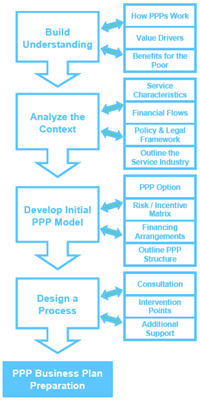
|
Using This Guideline
Pro-poor Public Private Partnerships (PPPs) can supply better basic services (e.g. drinking water, waste collection, sanitation, etc) to poor communities in cities and towns. PPPUE’s first generation of Innovative Project Grants (IPGs) supported 3 national programmes and 11 projects to support pro-poor PPPs in 14 countries. A lot was learnt. These lessons are translated in this Guideline on how to start up a pro-poor PPP to deliver a basic urban service.
Successful PPP projects have a good understanding of PPPs from the beginning. The Guideline provides steps to make sure the main features of an effective pro-poor PPP are built in from the start. Do’s and Don’ts are raised from the experience of what works well and what does not. Examples and cases of pro-poor PPPs in practice
are also given. Examples are provided of PPP issues translated into contracts. Finally, information on where to get further support is provided.
Four basic steps are in the Guideline. 1. Build Understanding: know and explain how PPPs work and potentially deliver value, especially for the poor. 2. Analyze the Context: rapidly review the kind of service, financial flows, policy framework, and outline the service industry. 3. Develop Initial PPP Model: explore PPP options, assess risks / incentives, consider financing, and outline a PPP structure. 4. Design a Process: work out the consultation, intervention points and additional support needed to prepare a business plan for the PPP.
The Guideline can be used when:
-
Preparing PPP projects for funding support (IPG and other sources).
-
A request to support setting up a PPP to deliver a basic service is received.
-
A local service delivery problem is encountered and a pro-poor PPP could be a solution.
-
Developing national programmes to use PPPs for basic service provision.
-
Generally promoting and facilitating the use of PPPs to deliver services to the urban poor.
The Guideline is intended for the main sponsors involved in promoting pro-poor PPPs. This includes UNDP Officers, local governments, local experts, potential private partners, Global Learning Network partners, and others.

|
|






